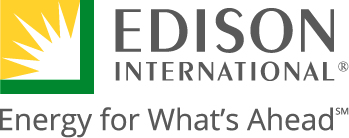Edison International 2021 Sustainability Report: Environmental & Social Justice

Edison International 2021 Sustainability Report
Edison International is committed to doing our part to support communities that are particularly vulnerable to and face disproportionate economic, social, public health and other effects from climate change and other environmental hazards (“environmental and social justice,” or ESJ, communities) in building adaptative capacity. We believe that a transition to clean energy has the power to create a future full of socioeconomic benefits to all, and we are working hard to ensure that such a transition is just and inclusive.
Our approach to this just transition is focused on expanding access to jobs, training, programs and services to ESJ communities both at SCE and through Edison Energy’s1 client engagements. Given SCE’s wires-focused business model and Edison Energy’s focus on supporting customers in meeting their climate goals, we anticipate that the clean energy transition will continue to support our workforce. We have focused our efforts on building our diverse talent pipeline, in particular by expanding access to training for underrepresented talent and investing in SCE’s supplier diversity program. For more information see Leading with Diversity, Equity & Inclusion.
Beyond expanding economic benefits associated with clean energy-related work and contracting opportunities to underrepresented talent, SCE is focused on designing and implementing customer programs and services that provide clean energy benefits to ESJ communities. Supported by a strong commitment at the CPUC to include ESJ communities in its decision-making process, we have strengthened our ability in recent years to gather early input from ESJ communities and to apply it to our work, as well as to raise awareness within ESJ communities of clean energy opportunities.
In 2021, many of SCE’s major programmatic accomplishments included significant planned investments in ESJ communities. For example, the launch of Charge Ready Light Duty (see Light-Duty Vehicles) included a requirement that 50% of all new installations are to be in disadvantaged communities. We also committed 75% of new Low-Carbon Fuel Standard-funded programs to ESJ communities, totaling more than $200 million over the next four years and expect to commit a similarly sized investment from this funding source in the second half of the decade. SCE has a similar focus in its building electrification programming, including running pilots in ESJ communities and proposing in the Building Electrification Application to dedicate about one-third of heat pump and 40% of electrical infrastructure program incentives in ESJ communities or to support incomequalified customers.
To inform this work, SCE engaged regularly with its Community Advisory Panel and Clean Energy Access Working Group (see Stakeholder Engagement). We also worked with the California Clean Fuel Reward program to determine best practices for engaging underserved communities in EV adoption. SCE engaged ESJ communities in preparing its climate adaptation vulnerability assessment (see Climate Adaptation).
Edison Energy1 is helping clients deploy impactful clean energy projects and programs that serve to uplift local communities. Because most of its clients want to be leaders in supporting a just and equitable clean energy transition, Edison Energy sees this as an opportunity to provide them with insights on how they can achieve equity across their energy strategies.
See Community Investments to learn more about Edison International's philanthropic focus on underserved communities.
View the full 2021 Sustainability Report here.
1Edison Energy is not the same company as Southern California Edison, the utility, and Edison Energy is not regulated by the California Public Utilities Commission.

